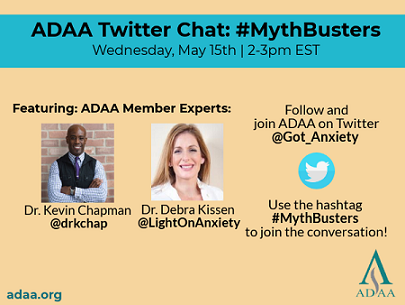ADAA Member Experts Debunk Common Anxiety Myths #MythBusters
ADAA Member Experts Debunk Common Anxiety Myths #MythBusters

In honor of Mental Health Awareness Month, Drs. Debra Kissen and Kevin Chapman hosted a Twitter chat under the title #MythBusters where they debunked common myths surrounding anxiety and provided the actual corresponding facts.
M1: Taking some deep breaths or breathing into a brown paper bag will help you when you feel anxious.
Dr. Chapman: Breathing skills as they relate to anxiety can be used as ‘portable’ tools to remain in uncomfortable situations. “Riding the wave” and recognizing that anxiety runs a natural course is key rather than distraction. Anxiety is rarely a problem unless chronic.
Dr. Kissen: Although accessing slow, gentle breathes can be a powerful tool in moving past anxiety, there are few things more annoying to telling someone who is anxious, stressed or panicking to "just take a deep breath." Breathing skills can be super helpful for down regulating and calming self down but like all tools in the tool box, when over used or in properly used can cause more harm than help...especially when enhancing one's tendency to hyperventilate.
M2: If your child is suffering from anxiety, you should force him/her to do the things he/she is afraid of.
Dr. Chapman: Forcing a child with anxiety to do the things he/she is afraid of is “flooding” with distress and usually backfires and perpetuates the anxiety. Being sensitive, inquisitive, modeling safety, and gradually confronting fears while reinforcing the success is huge.
Dr. Kissen: If your child is struggling with anxiety DO compassionately assist them in gradually facing their fears DON'T force them to do things they are afraid of. The difference between the 2 sounds subtle but makes all the difference in the world.
M3: You should always avoid stressful situations or distract yourself when facing your fears.
Dr. Chapman: Emotions run a natural course. Distraction often provides temporary relief but paradoxically backfires and perpetuates distress. Learning new, non-threatening associations is best achieved by ultimately confronting fears consistently.
Dr. Kissen: Stress and anxiety are NOT dangerous. What IS hazardous to life satisfaction is handing over your life to anxiety and making your world smaller and smaller in an attempt to avoid feeling stressed or anxious. You can handle these uncomfortable feelings! It is worth it to feel the occasional (or at times frequent) anxious feeling in order to live your life to the fullest. You are stronger than you know and can handle the discomfort.
M4: You must have experienced a traumatic event to have a phobia.
Dr. Chapman: A soapbox issue for me indeed. Though an element for many phobias certainly doesn’t explain it all. A combo of genetics & learning experiences, including modeling and informational transmission in the context of an object/situation is often true. Often the traumatic event isn’t related to the phobia per se. Experiencing panic symptoms in the context of the feared object or situation is technically traumatic in nature & creates a “learned alarm”
Dr. Kissen: Occasionally the origin of a phobia is a traumatic event but more often it is unclear why your brain is hyper sensitive to certain stimuli. The good news is that you don't need to know why you are afraid of something to move past that fear.
M5: Social anxiety is the same as being shy.
Dr. Chapman: Social anxiety and ‘being shy’ aren’t the same. Shyness or behavioral inhibition can serve as a risk factor for social anxiety. Additionally, social anxiety is a normal part of life and is only problematic when it creates distress and impairment in functioning.
Dr. Kissen: There is nothing unhealthy or problematic about being shy. In contrast, by definition, social anxiety disorder (or social phobia) entails one experiencing noteworthy emotional distress and impaired functioning due to their fear of being judged negatively.
M6: Your anxiety and depression will improve if you’re patient and focus on positive things.
Dr. Chapman: Telling those who struggle with anxiety and depression to “just think positively” is extremely toxic and harmful. CBT, exercise, mindfulness, having social support, interpersonal therapy, medication and a plethora of other suggestions ARE helpful strategies.
Dr. Kissen: Telling a friend or loved one to "focus on positive things" can be extremely hurtful. When someone's brain is stuck on the anxiety or depression channel, they are not choosing to focus on what is wrong or dangerous but their brain is. There are ways to train your brain to attend to the positive aspects of life but this takes hard work, support and frequent repetition. It does not just happen by willing oneself to be more positive.












